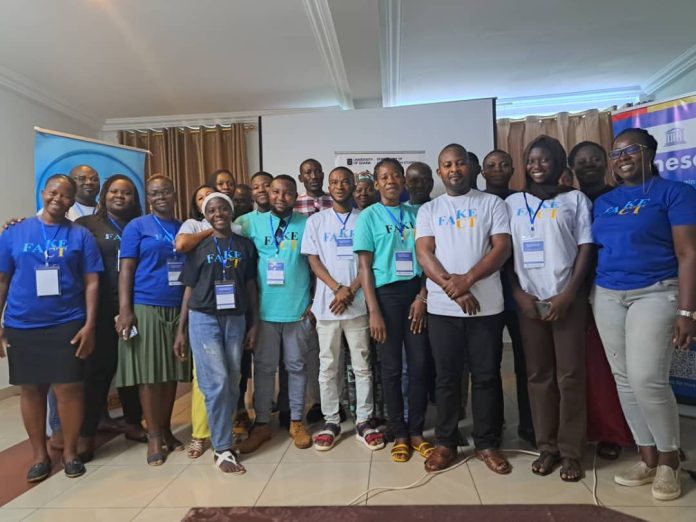Rural journalists representing various media outlets in Ghana recently participated in an intensive two-day fact-checking training organized by the Department of Communication Studies at the University of Ghana, in collaboration with Dubawa and with support from the United Nations Educational, Scientific and Cultural Organization (UNESCO). The training took place at the Tyco City Hotel in Sunyani, in the Bono Region of Ghana.
Under the guidance of Dr. Abena A. Yeboah-Banin, the head of the Department of Communication Studies at the University of Ghana, the participants were welcomed and briefed on the purpose of the training. The primary objective was to equip rural journalists with essential fact-checking skills, enabling them to combat the growing challenge of misinformation within their communities.
Leading the training sessions, Dr. Theodora Dame Adjin-Tettey provided valuable insights into the complex landscape of the information ecosystem, highlighting the various disorders that surround information, including misinformation, disinformation, and malinformation. With a focus on fostering critical thinking and analytical skills, participants gained a comprehensive understanding of the impact of these information disorders on public discourse and societal well-being.
A team of expert trainers from Dubawa Ghana, led by the Nathan Gadugah, provided the journalists with practical training on the process of fact-checking. Additionally, the trainers, including Rosalena Ahiable, equipped the trainees with a range of software tools designed to facilitate effective fact-checking and combat disinformation, misinformation, and malinformation. The session covered the utilization of tools such as Google reverse search, Tineye, and Invide video analysis, among others, empowering the journalists to verify the accuracy of information they encounter in their reporting.
Highlighting the legal implications of publishing false news, Lawyer Zakaria Tanko delivered a comprehensive session on the consequences associated with spreading misinformation. Participants gained crucial insights into the legal frameworks and responsibilities associated with journalistic integrity.
The private legal practitioner familiarized the attendees with the Right to Information Act (RTI Law act 898), imparting knowledge on how to navigate the legal landscape and effectively request information from public institutions.
The fact-checking training not only enhanced the professional capabilities of rural journalists but also provided them with a robust toolkit to combat information disorder within their communities. Armed with newfound knowledge, skills, and legal awareness, these journalists are poised to play a pivotal role in promoting accurate and reliable information, ultimately contributing to a more informed and democratic society in Ghana.
As Ghana continues to face the challenges posed by misinformation, initiatives such as this fact-checking training are essential in empowering journalists to act as reliable sources of information and guardians of truth in the digital age. With the support of academic institutions, organizations like Dubawa, and global entities such as UNESCO, the fight against information disorder is gaining momentum, offering hope for a more transparent and trustworthy media landscape in Ghana and beyond.
Source: nkilgifmonline.com




